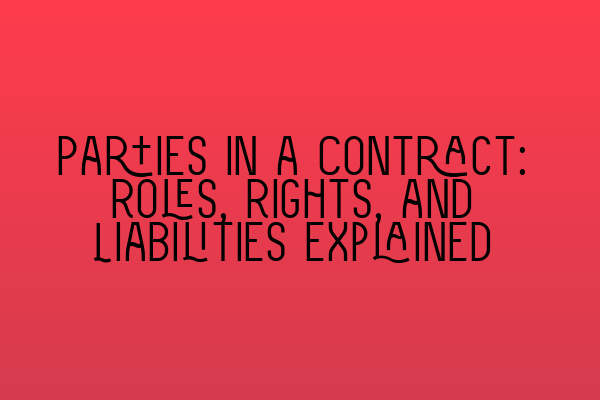Parties in a Contract: Roles, Rights, and Liabilities Explained
Contracts are a fundamental aspect of modern business transactions. When two or more parties enter into a contract, they establish a legally binding agreement that outlines their rights and responsibilities. Understanding the roles, rights, and liabilities of the parties involved in a contract is crucial for ensuring the smooth execution of the agreement and managing any potential disputes that may arise.
Introduction to Contract Parties
Before we delve deeper into the roles, rights, and liabilities of the parties in a contract, let’s begin with a brief introduction. A contract typically involves two main parties: the offeror and the offeree. The offeror is the party who makes an offer and presents the terms of the contract, while the offeree is the party to whom the offer is made.
Rights and Obligations of Parties in a Contract
Once the offeror has presented the proposal, the offeree has the right to accept or reject it. If the offeree accepts the offer, both parties must fulfill their respective obligations as outlined in the contract. These obligations can include providing goods or services, making payments, or delivering certain results within a specified timeframe.
Each party also has certain rights within the contract. These rights serve as a protection mechanism and ensure that the parties’ interests are safeguarded throughout the agreement. Some common rights in a contract include the right to enforce the terms, seek remedies for breach of contract, and terminate the agreement under specific circumstances.
Liabilities of Parties in a Contract
Liabilities arise when one or both parties fail to fulfill their obligations as stated in the contract. A breach of contract occurs when one party fails to perform their duties or violates any of the agreed-upon terms. In such cases, the innocent party may seek compensation for any losses suffered due to the breach. The extent of liability may vary based on the nature and severity of the breach, as well as the terms specified in the contract itself.
Primary Parties in a Contract
While the offeror and offeree are the primary parties in a contract, it is important to note that there may be other individuals or entities involved. These parties can include third-party beneficiaries and assignees.
Third-party beneficiaries are individuals or entities that may not be direct parties to the contract but can still benefit from it. For example, if Party A enters into a contract with Party B to provide services to Party C, Party C becomes a third-party beneficiary.
Assignees, on the other hand, are individuals or entities to whom a party transfers their rights or obligations under the contract. This transfer is usually done through an assignment agreement. Assignees step into the shoes of the original party and assume their rights, obligations, and liabilities.
Conclusion
Understanding the roles, rights, and liabilities of the parties involved is essential for successfully navigating a contract. By clearly defining these aspects, parties can ensure that their interests are protected, and any potential disputes can be resolved effectively.
Contracts can be complex, and it is advisable to seek legal assistance when drafting or entering into an agreement. A qualified contract law solicitor can provide valuable guidance and help you navigate the intricacies of contract law.
If you need assistance with contract law or have any related concerns, our team at SQE Contract Law is here to help. Contact us today to discuss your specific requirements and ensure a smooth and legally sound contract process.
Keywords: contract parties, roles in a contract, rights and obligations, liabilities in a contract, offeror, offeree, breach of contract, third-party beneficiaries, assignees, contract law solicitor.
